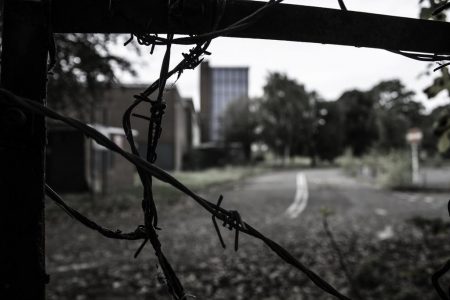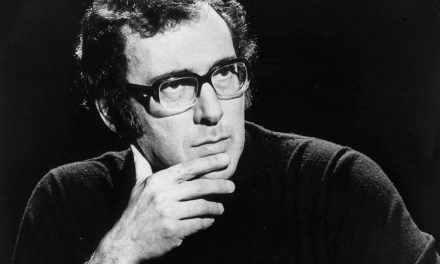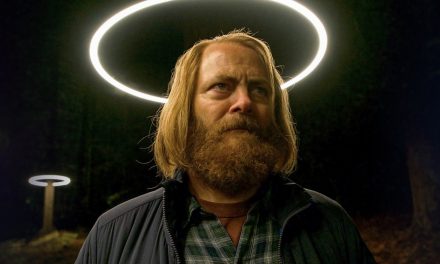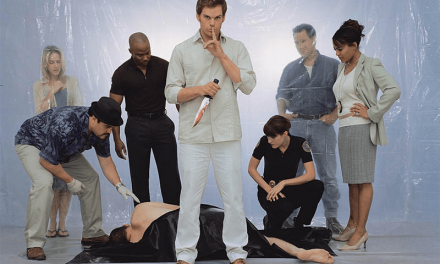In his preface to the revised edition of Hitchcock’s Film’s Revisited (2002), the late Robin Wood’s commendably honest mini-autobiography (which only briefly touches upon Hitchcock and his work, focusing more on the context in which Wood wrote about it) concludes with a consideration of the question repeatedly posed by the protagonist of Christopher Nolan’s Memento (2000): “Where are you now?” After relating his then-current attitudes towards film criticism, politics, religion and patriotism, Wood turns to Higher Education, at which point the already wistful tone of his writing (he had recently survived a near death experience, and perhaps sensed that he had not many years ahead) becomes decidedly elegiac. Reflecting upon the state of education in Canada, whence he had relocated in the late 1970s, Wood claims that the term had by this time altered in meaning from when he was a student at Cambridge in the 1950s:
Then, it meant (to me at least) something like “defining oneself in relation to our cultural history, our living past, and in relation to the world today; developing oneself intellectually, emotionally, culturally; learning to make choices, to discriminate, discovering oneself, developing oneself.” Today (to judge by the responses of many students I have encountered), it means, “Will this help me to a career? If not, will I at least get a good grade?” … At Cambridge, we attended a course because we were interested, and for no other reason … Nowadays I have not infrequently been approached by students on the first night of a course who asked, “What must I do to get a B plus?” (The correct answer: “You just failed” – but no one dares give it; I haven’t myself. It’s not the student’s fault, after all.) (xxxvi-xxxvii)
In my case, this would be replaced with the more prosaic “I wanna First, yeah?”; but point taken.[1]
For Wood, the rot began to set in when the writing of essays and awarding of grades were attached to lecture courses (ibid: xxxvi), and while conceding that he is not opposed to the concept of career-training colleges, he concludes by expressing a heartfelt desire that I’m sure many of us share: “I only wish that there were still just a few real universities, and that there were governments that supported such anomalies. The university as I knew it seems no longer to exist” (ibid: xxxvii).
Wood states that this “contagion” had spread to Britain years earlier (ibid: xxxvi), so I am unsure what he would have made of the education I received between 1992 and 1995 at what subsequently became MMU Cheshire.[2] I had applied to what at the time was called Crewe and Alsager College of Higher Education, but on our first night there the Vice Chancellor announced that, courtesy of the good offices of John Major and his team, we were now all officially ‘university’ students. Oh, how we cheered, albeit somewhat ironically; we knew it wasn’t really a ‘proper’ university. However, for me at least, it did turn out to possess many of the qualities of a ‘real’ university, as defined by Wood. Yes, my modular degree was assessed via submitted assignments such as essays, compositions, performances and exhibitions, but the education I received over three years in that funny little field in Cheshire (as our course leader liked to refer to the Alsager campus, now sadly demolished) definitely provided me with intellectual, emotional and cultural inspiration. These were possibly not of the same type – or at the same level – that Wood felt he had thrived upon at Cambridge, but I nonetheless came away inspired, and having at least made a start on the process of self-discovery.
Plus, my Creative Arts degree didn’t actually qualify me for a job (unless I wished to become a lecturer in Creative Arts, which I didn’t at the time – though I would now). It primarily asked me to think about things, and respond to them in an informed, considered manner.
On reflection, I feel certain this would have gained Wood’s approval.
I will probably write my own elegy to MMU Cheshire this summer, when the Crewe campus shuts up shop, and what is probably now called the Contemporary Arts cohort breathes its last (though not, I hope, literally). Nobody asked us for our feedback in the halcyon days of the 1990s; we were given things to go away and think about, and encouraged to come back with original work. I rarely asked my tutors for explanations outside of class, and occasionally submitted material that I knew wouldn’t please them, but which pleased me, because it said what I wanted to say.
On one occasion, a somewhat p*ss-taking group performance piece I helped ‘evolve’ (if that’s the right word) was graded with ‘a cabbage’ by the supervising tutor. In our viva he explained his marking thus: “We’re giving you a cabbage. You didn’t give us a proper piece, so we’re not giving you a proper mark.”
Now, that is both petty and brilliant, and one could not get away with it today, which is a great shame, because this calculated insult to our admittedly ill-conceived work at least made us think how best to respond and do better next time.
While it would be an exaggeration to say that I loved every minute of university, I enjoyed the overall process immensely. Having just spent three years out in the workplace, I appreciated how fortunate I was to be given time to essentially play around with ideas (and, yes, to party – particularly in the first year, which I knew I simply had to pass). Having been nominally self-supporting (i.e. possessing a full-time job) I was awarded a full maintenance grant, though this was diminished by 10% in my second year, if I remember correctly, and again in my third. If that felt like the thin end of the wedge, worse was to come. Grants were replaced by loans in 1999, and in the meantime the insidious horror of tuition fees had been introduced under Labour; yes, back in 1998 one could invest in a university education (it was now a financial transaction, not a life experience) for what today sounds an almost reasonable sum of one thousand pounds a year.
You know all this, probably better than I, who only started university teaching in 2010. At the time I joined the firm, colleagues were already lamenting that the quality of students had declined sharply from just ten years before, when – they claimed – there had still been a sense that most of the people they were teaching attended university because they wanted to learn. I didn’t feel that things were so very different when I began my HE career, but then I started out at a Russell Group university, teaching on a degree that focused on textual analysis and historical context. This felt entirely natural to me, as these were the areas I was studying and applying in my own PhD work, and while I was admittedly doing this partially as a route to full-time employment as a lecturer, I was also writing my thesis because it interested me, and I enjoyed it.
While not all the students I taught at this time were stellar, there was a general sense that they were engaged with the learning process for its own sake. It was always a thrill when student feedback indicated that, not only had they enjoyed the classes, they had felt inspired (there’s Wood’s word again) to go away and find out more for themselves. I remember one student writing that she had sought out The Player as a result of my showing the opening sequence in a genre lecture, and had enjoyed it so much that she was now digging out Robert Altman’s entire output. This was only eight years ago, but I’m getting a warm glow just thinking about it. It wasn’t perfect, of course. There was the perennial problem of non-attenders (though these were in the minority), and overseas students often struggled to adapt both to self-directed study and the challenge of writing essays and contributing to class discussions in a second language. Having worked in EFL for over a decade by this time, I hope I was equipped to meet these challenges.
Since then, I have had experience of working at various HE institutions, including a 1992 university, a former 1994 Group university, and an ex-technical college. At each of these I have provided theory components comprising between 20% and 50% of degrees with a practice/production-based, vocational bent, so it is perhaps unsurprising that the phenomenon outlined by Wood in 1992 – the focus on gaining the best possible grade, in order to achieve the best possible career – has become increasingly noticeable, and in light of successive governments’ attitudes towards Higher Education, perhaps inevitable.
It is also deeply regrettable, and, to be honest, rather sad. For one thing, I don’t think the undergraduate students I teach today have anything like the vast quantity of fun that I did at university. Whether utterly terrified of failing to achieve their desired grades or cynically demanding and entitled regarding the ‘service’ they have paid for, there is a real sense of many modern students doing what they are doing because they feel they have to, and not because they want to; the very issue that inspired Wood’s critique seventeen years ago, though now more pronounced.
It’s not all bad news, of course. I still enjoy what I teach, just as I did in 2010, and the feedback generally remains very positive – though I sometimes feel like a dancing bear, brought on to keep the students entertained and make the boring theory stuff ‘relatable’ (my, how I do loathe that word). There are moments of genuine pleasure, though, as when a first year student recently fed back that “the lectures included many things that I wanted to look into further … such as the work of Alfred Hitchcock.”
That’s one out of fifty-two who might just have been inspired to do some self-directed learning, which is not a bad average. With any luck, they will read Hitchcock’s Films Revisited, which was on the further reading list.
It isn’t all about student attitudes, however. As someone who is as engaged with their teaching as their research – and indeed tries to use the latter to inform the former – I have experienced some strange responses from colleagues over the years. At one university the fact that I was perceived as didactically committed was regarded with incomprehension by professors whose priority was to obtain sufficient funding to be bought out of their lecturing workload; one advised me to “do the bare minimum [in terms of teaching], and focus on your research.” At other places, the fact that I spent part of my workload on research (though not that much, believe me) was seen as something of an oddity, one ex-TV producer colleague questioning “why we need these academics who waste their time writing about things that don’t matter.”
Well, quite.
That said, I have witnessed several examples of teachers – whether practitioners, theorists, research active professors or teaching-only contracted academics – who are able, seemingly effortlessly (though it is by no means effortless), to inspire classes on their individual modules. In the current TEF-focused climate, this side of education is little encouraged, and little celebrated – and I don’t know what the solution is. There are still plenty of good lecturers out there, and some students who are genuinely interested in learning for its own sake – though these are increasingly in the minority. If Wood’s vision of Higher Education as, primarily, a place to think and grow no longer exists as a model, there remain pockets of good practice that resist the general shift towards customer-led service provision.
Apologies if I am preaching to the converted here, but as I see it there is room for hope. As one who is about to embark on a five-month research sabbatical (my first), I salute those who currently have their shoulders to the wheel, their backs to the wall, and their noses to the teaching grindstone (by no means an easy position to maintain). While away, I intend to give serious thought to how I can keep things ‘real’ in my own work – and I hope you are able to do the same.
Dr Richard Hewett is a lecturer in media theory. He has contributed articles to The Journal of British Cinema and Television, The Historical Journal of Film, Radio and Television, Critical Studies in Television and Adaptation. His book, The Changing Spaces of Television Acting: From Studio Realism to Location Realism in BBC Television Drama, was published in 2017, and will be out in a slightly more affordable paperback edition next year.
Footnotes:
[1] One wonders what he made of the NSS, which was launched three years after he wrote this.
[2] I would certainly value his opinion; Hitchcock’s Films Revisited was the book that first inspired me to think seriously about analysing screen media as a possible career route – though it took me a while to do anything about it.







Great piece.
Never imagined I’d read an article that somehow managed to link Crewe to Robin Wood, so massive kudos for that!
Many thanks, Martin!
Thanks for such an insightful and articulate essay, Richard. I, too, started teaching in 2010, finished a PhD in 2014, and started working at Bournemouth University the same year. Even in such a short-time, I share many of your experiences and disgruntlements. My experience at University in 2007—which was for a second degree—was radically different to the rest of the study body, not least because I was a mature student. I loved being at uni; loved learning as well as opening my eyes and ears to culture that had not been on my radar (I come from council estate origins so hardly likely to have come across Truffaut!). My University experience at Sunderland literally (and symbolically) changed my life, my self-narrative. I like the way you conclude on hopefulness, and perhaps the days that Wood waxes nostalgic over is past. But I honestly worry about HE, perhaps overmuch. Mind you, I’ve just finished a lecture today when the students said: “who is Kiefer Sutherland?” Maybe that triggered some negativity. In any case, I enjoyed reading your essay, Richard. Many thanks
Many thanks, William; I’m glad you enjoyed the blog. It is sometimes surprising how little media students seem to know about their chosen subject (before Christmas I was amazed when I referenced the then-recent Sean/Katya Strictly kiss kerfuffle in a lecture, to a sea of blank expressions). However, ignorance (not knowing) we can fix (assuming the students attend class, and pay some attention to what is going on around them). My real worry is the seeming reluctance of some students to think for themselves; the desire always to be shown, rather than trying to work it out. However, as Wood points out, this isn’t entirely their fault in a culture where the focus is primarily on attaining the required/desired result, rather than the intellectual process of how best to get there. On the bright side, I recently started supervising a PhD student I had preciously taught as an undergraduate. He came to university to learn how to become a media producer, but has now switched to academic research and writing – so there is hope!
I love this Richard, and, as I share most your observations and experiences at the moment, I think the most commendable aspect of this piece is its restraint.
No cabbages awarded here.